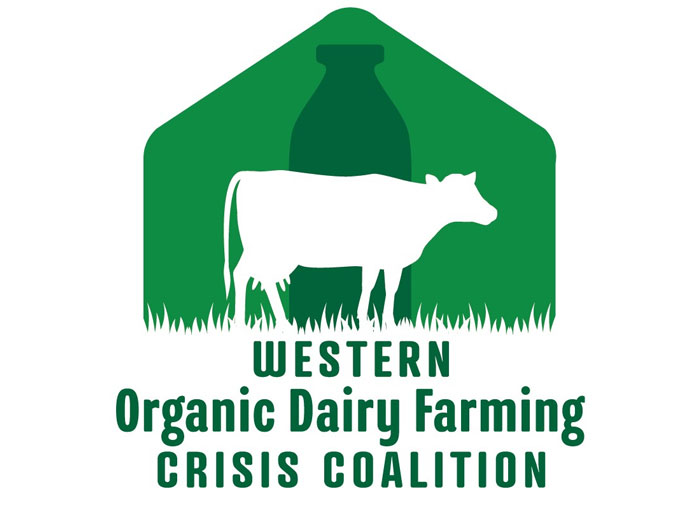Historic Drought is Creating an Ongoing Crisis for Organic Dairy Farmers
November 8, 2022 | 6 min to read

PETALUMA, Calif.–Straus Family Creamery, a certified organic creamery whose mission is to sustain family farms and revitalize rural communities, organized the newly formed group named Western Organic Dairy Farming Crisis Coalition. Organic dairy producers and agricultural industry supporters are part of the coalition seeking immediate emergency drought relief assistance for organic dairy farmers. The drought has created a dramatic increase in feed costs (up to 50 percent), feed shortages, and drought-related operating costs.
Drought is Threatening Local Dairy Farms, Food Supply, and Communities
Several organic dairies expect a severe financial loss at an average of $250,000 this year. Financial loss is expected in 2023 if the drought and inflation continue. Some farmers have had no choice but to shut down their businesses this year—threatening the viability of the organic dairy farming sector in the future—impacting regional milk and food supplies and rural communities’ economic stability.
“Farmers have survived through drought before, but the current drought coupled with inflation and other impacts are leaving dairy farmers strapped like never before,” said Dayna Ghirardelli, executive director of Sonoma County Farm Bureau. “In my many years of working with local dairy families, I’ve seen dairies contemplating their future in tough times, but they’ve hung on encouraged that the situation will turn around. This time is different.”
Despite the USDA having long-standing farm assistance programs for dairy farms facing a financial crisis, these programs are not enough to save organic dairy farms confronting a dire situation. Farmers need immediate aid to survive. Stricken by the unprecedented drought, rising feed costs, and feed shortages, some farmers are already selling off their milking cows and going out of business. Several organic dairy farmers predict they may be compelled to shut down their farms in the next few months.
Organic Farming Positively Impacts the Farming and Food System
United States farmers are less than two percent of the country’s job force and family farms provide approximately 85 percent of the country’s food supply. Slightly more than 10 percent of California is farmed organically, and it is barely more than one percent nationally, according to California Certifiers of Organic Farmers (CCOF).
Organic farmers share a commitment to cultivate and protect the land and communities for generations to come. Organic land management and regenerative agriculture can strengthen pasture productivity, make grasses more drought resistant, improve water quality and soil health. Organic dairy farmers in the Western states are at a turning point, and if relief does not come through, it could change dairy farming and consumer food choices far into the future.
“If we have to continue to farm with these challenging climate conditions, then farmers will need to innovate more to survive,” said Albert Straus Founder and CEO, Straus Family Creamery. On Albert Straus’ organic dairy farm, despite the drought, he said that 2021 was one of the best pasture years. This year, the Straus Dairy Farm exceeds the USDA Organic Pasture Standards. This is a result of organic agriculture, carbon farming practices, and rotational grazing to stimulate pasture growth and carbon sequestration.
Climate-positive farming practices offer dairy farmers a more sustainable, viable business model but it can be economically challenging to implement if farmers are only trying to survive. Hay feed supplies in the West are in dangerously short supply as the regional drought persists. Some conventional dairy producers are now purchasing a limited supply of organic alfalfa hay, potentially leaving organic dairy farms without enough feed for their animals in the coming months.
“Local family farms and ranches are essential to West Marin’s community,” said Stefan Parnay, who serves as Marin County’s agricultural commissioner. “These farms and ranches feed us fresh, healthy food not only in Marin County but throughout the entire state and other parts of the country.”
On behalf of the coalition, mission-driven Straus Family Creamery is currently engaging with state and federal politicians and agricultural agencies. The coalition is organizing meetings and sending letters to seek emergency aid to help save organic dairy farms.
How You Can Help
Concerned citizens can act by signing onto the coalition’s new public letter addressed to USDA Secretary of Agriculture Tom Vilsack that will be shared with California Food and Agriculture Secretary Karen Ross, and other Western U.S. governors. When possible, purchase USDA certified organic dairy products from producers who purchase from local organic dairy farms. Other ways to get involved are contacting California senators and local representatives, including those who sit on the agricultural sub-committees—click for house and senate—and give feedback about organic farming and products on the upcoming Farm Bill. More background here.
Western Organic Dairy Farming Crisis Coalition: The coalition was formed in August 2022 to address the unprecedented dairy crisis, prioritizing helping organic dairy farmers, their farms, and animals. The coalition includes Western organic dairy producers and brands, local government, feed suppliers, and local farm bureaus—Straus Family Creamery, Clover Sonoma, Cowgirl Creamery, Alexandre Family Farm, Darigold (Northwest Dairy Association), Mount Rainier Creamery, Neutral, Organic West Milk, Rumiano, Organic Farmers Association, Western Organic Dairy Producers Association, California Certifiers of Organic Farmers (CCOF), County of Marin, and Sonoma County Farm Bureau.
Straus Family Creamery, based in Petaluma, CA, is a Northern California, certified organic creamery offering minimally processed organic dairy products made from organic milk supplied by family farms in Marin and Sonoma Counties, including Straus Dairy Farm. Straus Family Creamery continues to make business decisions based on its mission to help sustain family farms, revitalize rural communities, and protect the environment. The family-owned business sustains collaborative relationships with the family farms that supply milk, offering stable prices and predictability in what can otherwise be a volatile marketplace. Learn about the Straus difference at StrausFamilyCreamery.com.
